The annual Phillip and Ruth Hettleman Prizes for Artistic and Scholarly Achievement have been awarded to five promising faculty members who exemplify groundbreaking and innovative research along with future career promise.
The late Phillip Hettleman, a member of the Carolina class of 1921, and his wife Ruth established their prestigious named award in 1986 to recognize the achievements of outstanding junior faculty. The recipients of the $8,000 prize will be recognized at the November 3 Faculty Council Meeting. They will also deliver a presentation on their research during University Research Week on October 24 from 3 to 5 p.m. in the School of Social Work’s Tate-Turner-Kuralt Auditorium.
This year’s Hettleman Prize awardees are: Yaiza Canzani, associate professor in the Department of Mathematics within the College of Arts and Sciences; Brian Conlon, associate professor in the Department of Microbiology and Immunology within the School of Medicine; Angel Hsu, assistant professor in the Department of Public Policy within the College of Arts and Sciences; Pengda Liu, associate professor in the Department of Biochemistry and Biophysics within the School of Medicine; and Alex Worsnip, associate professor in the Department of Philosophy within the College of Arts and Sciences.
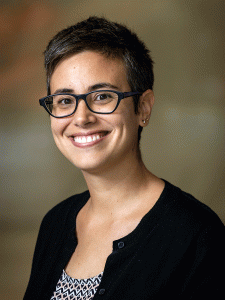 Yaiza Canzani
Yaiza Canzani
Yaiza Canzani’s research focuses on understanding the behavior of Laplace eigenfunctions, which play a crucial role in explaining physical phenomena such as wave propagation, heat conduction, acoustics and quantum evolution.
Canzani’s work bridges microlocal analysis, partial differential equations, probability, geometry, and dynamical systems. Her scholarship is internationally recognized — she was awarded a Sloan Fellowship, the Sadosky Research Prize in Analysis, and a National Science Foundation CAREER grant.
In his nomination letter for Canzani, Bowman and Gordon Gray Distinguished Term Professor of Mathematics Jason Metcalfe says, “Within an extremely active and competitive field of mathematics Canzani is developing transformative tools that will have an immense and long-lasting impact. She is obtaining historic results and is an elite scholar whose promise for discovery cannot be exceeded.”
Over the past several years, Canzani developed a research program that aims to describe how Laplace eigenfunctions concentrate near a given point by understanding how they behave when localized to tubes centered along the geodesics that run through the point.
Canzani received her doctorate from McGill University. She was a Benjamin Peirce Fellow at Harvard University and a member of the Institute for Advanced Study.
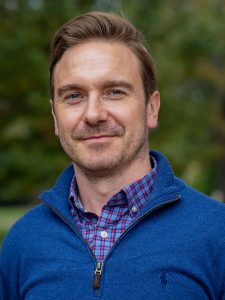 Brian Conlon
Brian Conlon
Brian Conlon is a leader in the field of antibiotic resistance and focuses on alternative strategies to treating infections with existing antibiotics. He aims to make previously ineffective treatments work better by manipulating how the treatment is delivered on a microbial level and reversing resistance by tricking the bacteria into responding to medication.
Conlon also researches how diabetes impacts treatment for antimicrobial resistance, and how to make the battleground inside someone’s body more hospitable to treatment by pairing an antibiotic with another drug.
“His finding that innate immune cells can inhibit antibiotic activity is a major discovery and paves the way for the future development of therapeutics to augment the immune response and make antibiotics work better in patients,” says Craig Cameron, professor and chair of the Department of Microbiology and Immunology, in his nomination letter for Conlon.
As a postdoctoral researcher Conlon published nine papers and his work appeared in the journals Nature and Nature Microbiology. Since establishing his lab at Carolina in 2016, Conlon has published 17 papers in journals including PLoS Biology, Cell Chemical Biology, eLife, and Nature Microbiology. His work has also led to two patents that promise to form the basis of novel therapeutic developments.
Conlon earned a doctorate in microbiology from University College Dublin and completed postdoctoral training at the Antimicrobial Discovery Center at Northeastern University.
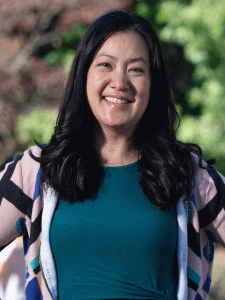 Angel Hsu
Angel Hsu
Angel Hsu applies data-driven approaches to evaluate climate and environmental policy, primarily at the state and local levels. She leads The Data-Driven EnviroLab, frequently calling upon others from different disciplines to collaborate on research.
Collectively, her work has been influential in shaping the research agenda among those studying global climate governance and developing the quantitative approaches used to assess the impact and performance of subnational and non-state actors.
In his nomination letter for Hsu, Daniel P. Gitterman, Duncan MacRae ’09 and Rebecca Kyle MacRae Professor of Public Policy, says, “Hsu has made important theoretical, substantive, and methodological contributions to climate policy. Her research is highly visible and influential, and her trajectory and future promise are highly positive. Her contributions to research, teaching and service at Carolina are exemplary.”
Hsu’s work has been published in several leading journals, including Nature, Environmental Research Letters, and Climate Policy, contributing novel research in ways that are indicative of her status as a leading scholar in global environmental policy and her engagement in timely policy debates.
Hsu earned an MPhil in environmental policy from the University of Cambridge and a doctorate in environmental policy from the Yale School of Environment. Following her PhD, she served for two years as a postdoctoral associate with the Urbanization and Global Change Group at Yale University.
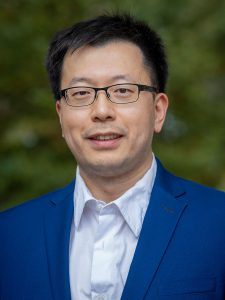 Pengda Liu
Pengda Liu
Pengda Liu studies cancer biology and the molecular mechanisms underlying aberrant cell signaling events in human cancer. He is using this knowledge to develop novel anti-cancer therapies.
He has established a highly productive lab at UNC-Chapel Hill as an independent and collaborative investigator. Both styles of research have led to ground-breaking discoveries and to highly cited articles. Liu has an innovative approach, melding bioengineering expertise with hi-tech biochemistry, cell biology, genetics, and applying this to drug development. His lab focuses on two key cellular signaling pathways that can lead to disease and cancer when mutated.
In her nomination letter for Liu, professor and chair of the Department of Biochemistry and Biophysics Jean Cook says, “Liu has made seminal discoveries, and his research has great promise for future clinical advances. We believe that he represents the best in research, mentoring, teaching, and service that the School of Medicine has to offer.”
His postdoctoral work was published in high-impact journals, including Nature, Cancer Discovery, Nature Cell Biology, and Molecular Cell. In his seven years at Carolina, Liu has published 24 original research articles, seven review articles and one book chapter.
Liu earned his doctoral degree from East Carolina University and completed postdoctoral studies at Harvard University.
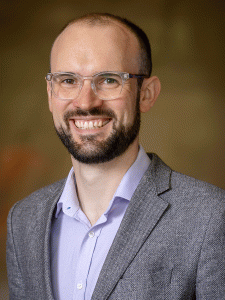 Alex Worsnip
Alex Worsnip
Alex Worsnip’s research of epistemology — the theory of knowledge — has made groundbreaking advances in the understanding of the nature of rationality. He proposes that there are two fundamentally distinct kinds of rationality — substantive and structural — with neither being reducible to the other, which has fascinating motivations and profound payoffs.
Worsnip made these advances in his field through a series of widely acclaimed articles published in top philosophy journals including the Journal of Philosophy, Mind, and Ethics. His work on rationality culminated in a book, “Fitting Things Together: Coherence and the Demands of Structural Rationality,” which was published by Oxford University Press in 2021. He also won the prestigious Young Epistemologist Prize from Rutgers University in 2019.
“Worsnip’s work has received a great deal of attention from other philosophers, including significant and widespread attention in articles appearing even before Worsnip’s own paper had appeared in print,” says Theda Perdue Distinguished Professor of Philosophy Marc Lange in his nomination letter for Worsnip.
Worsnip’s most recent and current research concerns the application of epistemology to social and political issues, with particular attention to the epistemic responsibilities of ordinary citizens in a democracy. For example, he has argued that being an epistemically responsible participant in democratic deliberation requires consuming news from sources of different politically partisan affiliations. Since 2022, he has been director of the Applied Epistemology Project at UNC.
Worsnip earned a BPhil in philosophy from the University of Oxford and his doctorate from Yale University. He completed postdoctoral training at New York University.